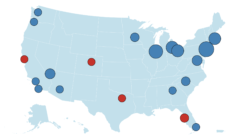-
U.S. Economy Slowed in First Half of 2025 as Tariffs Scrambled Data - 28 mins ago
-
Supreme Court’s Ideologically Split Rulings Occur Less Often Than You Think - 36 mins ago
-
Training Camp Power Rankings Sees Chiefs Unseated as AFC Kings - about 1 hour ago
-
Tsunami Reaches U.S., and Trump’s Former Lawyer Confirmed as Judge - about 1 hour ago
-
Rachel Morin’s Mother Blames Democrats for ICE Raid ‘Chaos’ - 2 hours ago
-
Here Are the Best Rides at Universal’s New Epic Universe Theme Park in Orlando - 2 hours ago
-
Nintendo Direct Coming This Week – Where to Watch and What to Expect - 2 hours ago
-
‘Anybody but Mamdani’: 5 Groups Emerge to Raise Millions in Attack Funds - 3 hours ago
-
Map Shows Where House Prices Are Rising and Falling Fastest - 3 hours ago
-
Ozzy Osbourne’s Coffin Will Be Taken Through His Hometown’s Streets Before Funeral - 3 hours ago
Speeding Laws Change for Millions in Florida: What To Know
Floridians faced sweeping changes on July 1 as new legislation making “dangerous excessive speeding” a criminal offense in the state went into effect.
House Bill 351, effective statewide, made it a criminal offense to drive more than 50 mph above the posted speed limit or to travel at 100 miles per hour or more in a manner threatening public safety.
Newsweek contacted Florida Governor Ron DeSantis and the Florida Highway Patrol for comment via email on Thursday.
Florida’s Legal Shift and Why It Matters
Offenders face up to 30 days in jail and a $500 fine, or both, for a first conviction, while a second violation within five years carry penalties of up to 90 days incarceration, a $1,000 fine, or both as well as a license suspension for between six months and one year if the violation occurs within five years of the first.
The law also mandates court hearings for drivers caught at 50 miles per hour above the limit or more. Officers were also empowered to apply civil penalties for those at 30 mph over the legal limit.
The crackdown aims to reduce traffic fatalities—speeding contributed to nearly 10 percent of fatal crashes statewide from 2019 to 2023, according to the Florida Department of Transportation. Jason Pizzo, an independent Florida state senator, said of the law: “You can’t drive 50 miles an hour over the speed limit and not think that’s not excessive and it’s dangerous.”

Joe Raedle/GETTY
The new speeding penalties are part of more than 100 Florida laws that took effect this July. Dangerous dog ownership, cruelty to animals, and health requirements for student athletes were among other areas targeted for reform in Florida this summer.
What People Are Saying
Speaking to local network WJHG, Damani Brown Jackson, a Palm City resident, said he backs the new law.
Jackson said: “I believe it is smart for Florida to have traffic laws; they need to start teaching more laws like this, they need to start taking the speed limit seriously, you know what I’m saying.”
Jackson added: “I’m going to be 100% more careful, I already know about it and have read about it, so I already have awareness of it, so yes, I’m going to be a lot more careful.”
Addressing News 13, Lt. Tara Crescenzi from the Florida Highway Patrol said: “We do feel like it’s needed. We’re seeing people that are traveling more than 100 miles per hour on the interstate, they’re cutting through traffic, they’re driving aggressively, they’re tailgating and those are all very dangerous behaviors.
“And really, this law is to educate as well. It’s to keep the drivers safe, the ones that are even engaging in this dangerous behavior.”
Other New Car Laws Across the U.S.
As of July 1 in Virginia, all adults must now wear seat belts in both front and back seats under the Christopher King Seat Belt Law, with violators subject to a $25 fine. Exemptions apply for health and occupational reasons. Virginia previously only required passengers in the front two seats and children to buckle up.
As of July 1 in Texas, new vehicle buyers will receive metal plates at the point of sale rather than temporary paper tags, which authorities say addresses problems with fraud and toll violations.
What Happens Next
It remains to be seen whether similar laws will be introduced in other states.
Source link




















